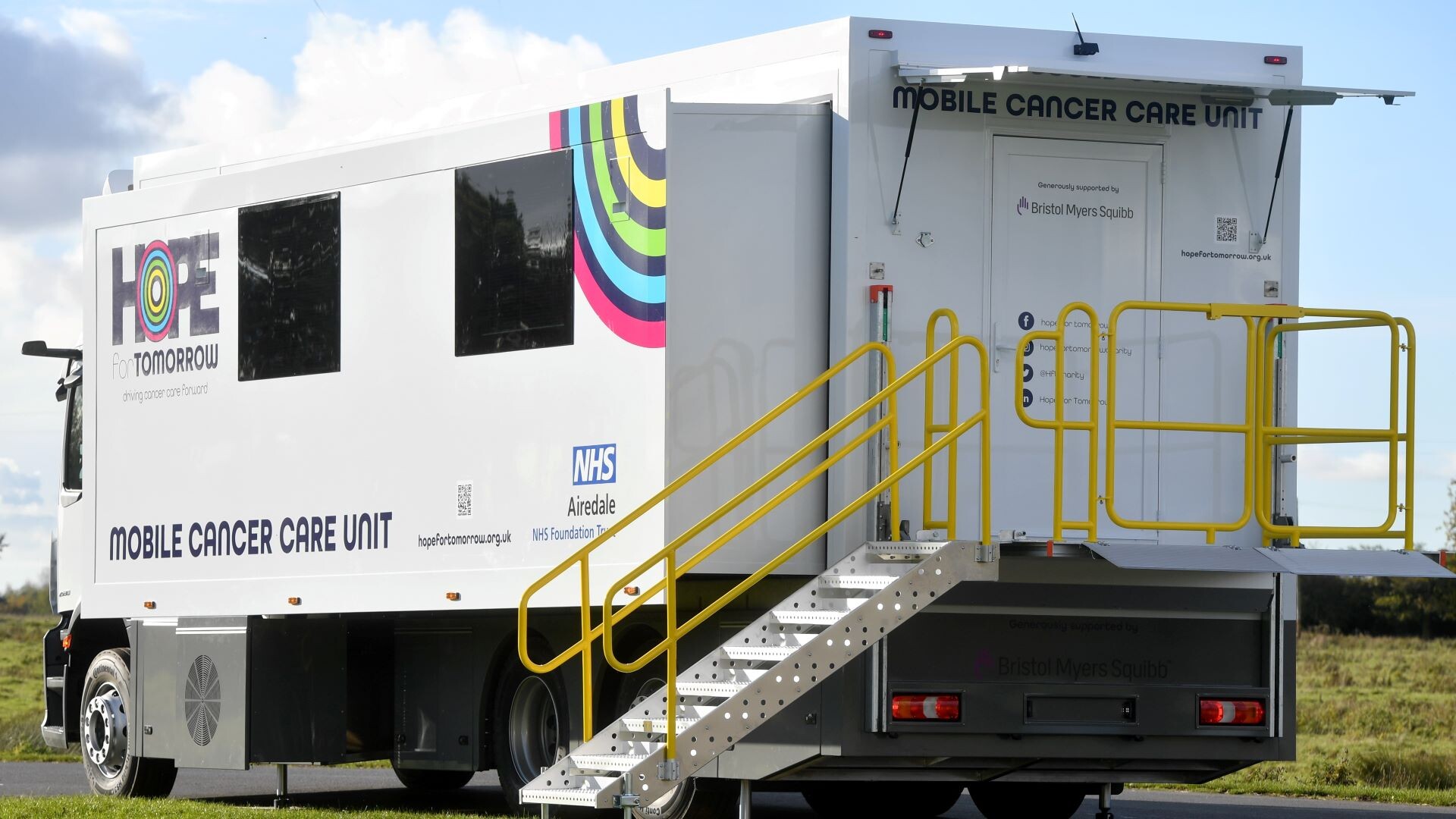Select a Category

Hope for Tomorrow launches ‘world first’ next generation mobile cancer care unit
Gloucestershire-based charity Hope for Tomorrow is launching their next Generation state-of-the-art fully mobile medical cancer care unit, a ‘world first’ in healthcare innovation, designed to change the way cancer care is delivered. In a unique partnership with the NHS, the mobile cancer care unit, will visit communities to offer a wide range of services including accessible daily clinics, cancer screening and education programmes, and a variety of treatments. Staffed by NHS oncology experts, the unit will address health inequalities, with a holistic treatment option for hard-to-reach communities. NHS Trusts will be able to offer patients more choice of where their cancer care is delivered with less time spent attending appointments and no compromise in quality or consistency of care.
Embracing digital innovation
Manufactured in Yate, South Gloucestershire, the unit includes two hydraulic powered consultation rooms which expand from its side. Each room will be fully connected with digital facilities so that patients and staff on board are able to connect remotely to the main hospital if necessary. Being attached to its HGV chassis means the unit is fully mobile and can be moved from location to location with ease.
Combatting the Covid backlog
Hope for Tomorrow designed and launched their first mobile cancer care unit in 2007 in Cheltenham. Since then, it has continually developed its fleet which grew to 13 units by the beginning of 2021. 12 mobile cancer care units are currently allocated to NHS Trusts, with two units remaining in reserve ensuring minimum interruptions to service. Throughout the Covid-19 crisis, available reserve units were deployed to support NHS Trusts wherever possible, allowing vital cancer services to continue where they may not otherwise have been able to. Hope for Tomorrow is also providing support with tackling the backlog caused by the pandemic; enabling treatments to take place away from the hospital environment and protecting this vulnerable patient group while helping to reduce the spread of Covid-19. The units deliver longer-term benefits to the NHS, in the form of a more streamlined Patient Pathway and the additional capacity on hospital sites for more complex treatments, supporting partner Trusts to meet NHS England targets. The new generation mobile unit will work in collaboration across two NHS Trusts, helping them to achieve NHS England’s 62-day cancer target for at least 85% of patients to start a first treatment for cancer within two months (62 days) of an urgent GP referral.
Mental health benefits
Moving cancer care closer to patients has proven health and wellbeing benefits. In some cases, once initial consultations and first treatments have taken place, mobile cancer care units allow for the removal of hospital visits for the majority of some patient’s treatments. The associated reduction in travel and waiting times delivers a vastly improved patient experience, reducing stress and anxiety levels.
Tina Seymour, CEO of Hope for Tomorrow said: “This unit has been three years in the making and the result is a testament to our relentless commitment in making crucial cancer care more accessible for all. By facilitating educational and support sessions within a community, the unit will allow NHS staff to provide life-saving information, such as self-examination guidance from specialist breast care nurses. The potential for urology clinicians to host catheterisation sessions for patients and a range of other clinics will enable patients to spend significantly less time attending hospital-based appointments.
She continued: “The need for more services like this is crystal clear and reflected in the increasing engagement we are seeing with key organisations. A number of outside agencies have also expressed a desire to support patients with services that go beyond healthcare from within the unit. Organisations including Citizens Advice and Be Clear on Cancer are investigating how they can offer services such as financial advice and benefit support via the unit.”
Funding next generation care
Hope for Tomorrow receives no statutory funding and relies entirely on donations from the general public, corporate donations and other private funding bodies. Building the Generation 3 mobile cancer care unit was made possible by a generous grant of £747,764.00 from pharmaceutical company, Bristol Myers Squibb, enabling the charity to launch the next generation in cancer care. The unit, named ‘Christine’ in honour of the charity’s founder who died of cancer in 2018.


